
Recently on Cyclingnews.com |
News feature, September 2, 2008
Katusha aims big for 2009
With a budget of over €15 million per annum, the new Katusha team looks set to be a big presence in world cycling. Some big-name signatures have already been secured, and the team is now looking for a Tour de France contender. Cyclingnews' Shane Stokes gets more details.
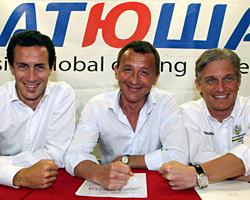
|
Building considerably on the nucleus of the existing Tinkoff Credit Systems squad, a number of important signings show that the Katusha team intends to become a major player from 2009 onwards. On September 1st the Russian outfit announced that a number of big guns would don its colours, including multiple Tour de France stage winner and maillot vert Robbie McEwen, Classic specialist Filippo Pozzato, Gert Steegmans and the Russians Vladimir Karpets and Alexandre Botcharov. Other signings include Kenny Dehaes, Stijn Vandenbergh, Antonio Colom and Joan Horrach.
Importantly, the team is also chasing a Tour de France contender and, according to its president Oleg Tinkov, they are going for the number one. "We are still talking to [Tour de France winner Carlos] Sastre; I hope we can persuade him to be a member of our team," Tinkov told Cyclingnews on Monday. "Budget? We have the budget to sign two riders like Sastre."
In a time when sponsors such as Crédit Agricole, Gerolsteiner, Barloworld and Saunier Duval are pulling out of the sport, the development of the high-budget Russian team shows that things are not all bad for the economics of cycling.
Details of the project were first revealed on the first rest day of this year's Tour de France. Under the plan three sponsors – namely Gazprom, Itera and Rostechnologii – will between them provide €30 million per annum for the new Russian Global Cycling Project foundation. Of this total, over half will go to the professional team, while the remainder will fund elements such as the new top-ranked Tour of Sochi, the activities of the Russian Cycling Federation plus a social and talent-developing project dedicated to working with schools and young athletes. (Read New ProTour race for Russia from 2009.)
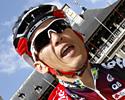
|
For many in the sport, it is the professional team which is perhaps the most significant development. Taking its foundation from the existing Tinkoff Credit Systems team, the new setup will be far larger and has the aim of winning the Tour within the next three years.
"We want to build the best-possible team in the world," team owner Oleg Tinkov told Cyclingnews after that announcement. "We want to come up with a good line-up, we want to come up with a good atmosphere amongst the team, and everybody has to get along. That is basically where we are aiming for now.
"From 2010 we can progress a lot. However, before then, we can look forward to winning some important races in 2009. Maybe even one Grand Tour, or some of the Classics. We have signed great riders and we are looking to buy [more] great ones."
Tinkov is a Russian multimillionaire who made his fortune through the development – and then the sale – of Tinkoff Brewery. It was bought by InBev in July 2005 for €167 million. He retained a chain of restaurants located in several Russian cities and now owns the Tinkoff Credit Systems bank. The latter has been publicised since the start of the 2007 season through its sponsorship of the eponymous professional continental team, and was itself an expansion of the earlier Tinkoff Restaurants Continental squad.
The current team is built around a nucleus of Russian talent, with its riders including 2008 Giro d'Italia stage winners Pavel Brutt and Vasil Kiryienka, as well as Olympic points race champion and former world junior/under 23 time trial champion Mikhail Ignatiev. However, while these riders are expected to stay, several new big names will also compete with the new top-ranked Katusha team in 2009.
Rumours, signings and budgets
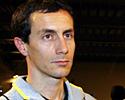
|
At the time of the announcement of the expanded team, rumours started flying about the budgets concerned and who would be involved. Cyclingnews sought confirmation then of the various signings, but the team wouldn't be coaxed into giving the game away.
General Manager Stefano Feltrin said that the team would abide by International Cycling Union (UCI) rules setting September 1st as the date when announcements could be made. He did however confirm that the team had had discussions with, "probably all the agents, most of the riders, almost everybody."
Despite this energetic approach to chasing big names, the team insisted that the rumours of it flashing the cash were unfounded. "One thing I want to make clear is that we are not overpaying anybody, we are very savvy with the money. I have been managing a team with a very low budget compares to other teams, so I know the value of money," said Feltrin. "We will not spend more than is the reasonable market price for anyone."
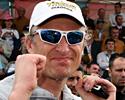
|
Tinkov echoed this. "There is a lot of speculation about the wages, people saying we are going to flood the market with money. It is not true. We want to pay very fair amounts, the right market price.
"Some of the people try to compare me with [Roman] Abramovich, but that is absolutely bulls**t... He is a very rich guy, and I am a poor guy," he laughed. "This is a Russian project. Sure we have a lot of money, but we will be smart and we will use it correctly. We are not arrogant, we will look at the cycling market, we have to listen, we have to respect the rules, and we have to go slowly from there."
Goals and structure
The announcement of the new sponsor and expanded team was made in Pau on the first rest day of the Tour. This was deliberate; in addition to ensuring a high exposure, it would also have enabled the team to make contacts with the race organisers and riders, and to have a closer look at an event it plans to target from next season onwards.
"To be honest, the Tour de France is our big goal for the project," said Feltrin. "That said, we are realistic enough to say that when you start with a big project like this, it could be that the first year is a tune-up time."
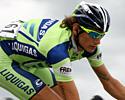
|
He accepts it's a case of taking things step by step. "When we started the project last year we said that our goal was to participate in some important races like the Giro d'Italia. We did that and we were very happy. This year, we said that participation is not sufficient; we need to do something more, we need to win stages. We achieved that goal. A realistic goal for 2009 is to create a team, create a great atmosphere with the riders working together and knowing each other, and win some important races moving towards the main goal, which is to get victory in the Tour de France.
"But if we don't win it in the first year, we won't consider it missing an objective."
The chances of the team winning the Tour in 2009 very much depend on who it signs, of course. If Sastre or another top name agrees terms, that will open up that possibility. But, even with Sastre or whoever else the team signs, the composition of the rest of the squad will remain important. It's not just about the leader, after all, but also about the quality of his backup.
Feltrin knows that even with a big budget, it is a case of gradually expanding. "Of course, I am very privileged and happy to be able to grow from something which started three years ago as a very little team. We made our way through and in the second year we are here with already some very good races and some very good results. Two stages in the Giro and participation in some very big Classics, and now we go to the Vuelta in this, the second year of our existence.
"Next year is probably going to be a transition year, of course we have a lot to learn, we have a lot to optimise, but definitely that is the goal. We want to grow very fast, taking the proper steps one by one, and we are sure that we can do very well in a short time."
The team hasn't forgotten those who have been riding this season. The majority of the 2008 squad are Russian, and even if the expansion mean that the line-up will be more international from 2009 onwards, he said that he plans to retain riders.
"I can tell you that the core of the existing Tinkoff team, people like Brutt, Ignatiev and Kiryienka will be in the team next year, we have already signed contracts," Feltrin said at the time of the Katusha press conference. "We will also have [Nikolai] Trusov, who was sixth last year on a stage of the Giro d'Italia and won a stage of the Tour of Brittany. And there is Alexander Serov, who won a stage last year on his first year in a professional team. He is a very good rider for any sprinter, as he can work hard for them as well as also sprinting for himself.
"Those five Russians are definitely in the project, we have already confirmed them. But they are not the only ones. As I said, we have 19 riders this year and I think we want to bring at least half of them into the next project.
Riding the big races
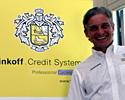
|
The UCI recently announced its intention to set up a new points system next year, incorporating both the historical monuments such as the Tour de France and the ProTour. Prior to that announcement, Tinkov made it clear that the team would not take sides in the long-running political dispute.
"We don't care about those battles," he stated. "We are not going to be put between the UCI, the organisers, whoever. What we want is to build together with Russia the best cycling team. We want to compete at the highest level, and whatever the rules are, we accept the rules.
"We also want to develop cycling in Russia. Andre Tchmil is going to be the general director of the Global Russian Cycling Project, this is bigger than the cycling team. The team is just one part of it."
Riding the Tour de France is a big part of that goal. Signing big riders is one way to enhance the chances of getting into the race, but so too showing a clear ethical stance. Following years of scandals, ASO places a big emphasis on a team showing it is clean. For any new squad to get into the race, its likely that the organisers will need proof that things are being done in the correct way.
Questioned on the team's plans in this area, Feltrin said that an internal testing programme has already been running for some time.
"This year our team already has internal anti-doping controls in place; we have disclosed this to the UCI and race organisers," he said. "We have internal medical regulations. All our riders have agreed to make themselves available for our internal controls, which are run by our team doctors. We can appoint any of them at any time to undergo a medical check, which we do on a regular basis."
However, given the growing feeling within cycling that internal tests need to be independently monitored, having the team's own doctors run such tests may not satisfy ASO. If necessary, Feltrin suggested that the team could consider going down the same route as other teams such as Columbia, Garmin Chipotle, CSC and Astana.
"We are definitely going to increase this standard," he stated. "If we see that the standard for other teams is going to be different, higher, or maybe going to an independent agency to run the internal controls, we will do the same. The minimum is that it will be the same as this year, but we may go to external agencies."
Photography
For a thumbnail gallery of these images, click here
Images by Roberto Bettini/www.bettiniphoto.net
- Star signing Robbie McEwen
- Italy's Filippo Pozzato will be one for Tour de France stage wins and Classics.
- General Manager Stefano Feltrin
- Oleg Tinkov celebrates his team's wins in this year's Giro d'Italia
- Oleg Tinkov with Stefano Feltrin (l) this July in Pau.
- Stefano Feltrin, Andre Tchmil and Oleg Tinkov (l-r) at the Katusha launch.
